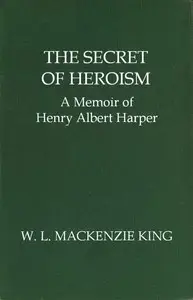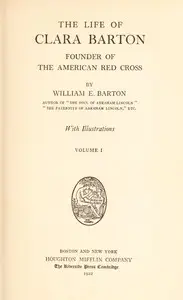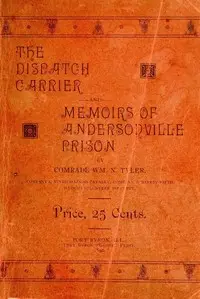"The Secret of Heroism: A Memoir of Henry Albert Harper" by W. L. Mackenzie King is an early 1900s account of a man's courageous choice. It tells the story of Henry Albert Harper, who died trying to save a young woman from drowning in a frigid river. The story explains the events around his death and also examines his character and the important principles that guided his life. After Henry Albert Harper's tragic death during a rescue attempt, the memoir starts with heartfelt public expressions of respect. A public gathering was held to celebrate his selflessness, which led to plans for a memorial statue representing heroism. King highlights Harper's bravery and his dedication to duty and love for mankind, setting the stage for a deeper look into Harper's life, inspirations, and the upbringing that shaped him into a hero, despite his short life.

The Secret of Heroism: A Memoir of Henry Albert Harper
By William Lyon Mackenzie King
When a young man sacrifices his own life to save another, society recognizes true heroism.
Summary
About the AuthorWilliam Lyon Mackenzie King was a Canadian statesman and politician who was the tenth prime minister of Canada for three non-consecutive terms from 1921 to 1926, 1926 to 1930, and 1935 to 1948. A Liberal, he was the dominant politician in Canada from the early 1920s to the late 1940s. King is best known for his leadership of Canada throughout the Great Depression and the Second World War. In August 1944, he ordered the displacement of Japanese Canadians out of the British Columbia Interior, mandating that they either resettle east of the Rocky Mountains or face deportation to Japan after the war. He played a major role in laying the foundations of the Canadian welfare state and establishing Canada's international position as a middle power. With a total of 21 years and 154 days in office, he remains the longest-serving prime minister in Canadian history.
William Lyon Mackenzie King was a Canadian statesman and politician who was the tenth prime minister of Canada for three non-consecutive terms from 1921 to 1926, 1926 to 1930, and 1935 to 1948. A Liberal, he was the dominant politician in Canada from the early 1920s to the late 1940s. King is best known for his leadership of Canada throughout the Great Depression and the Second World War. In August 1944, he ordered the displacement of Japanese Canadians out of the British Columbia Interior, mandating that they either resettle east of the Rocky Mountains or face deportation to Japan after the war. He played a major role in laying the foundations of the Canadian welfare state and establishing Canada's international position as a middle power. With a total of 21 years and 154 days in office, he remains the longest-serving prime minister in Canadian history.














